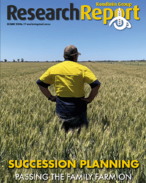This article is 7 years old. Images might not display.
That’s the message sheep and wool producers heard this week at the Best Wool Best Lamb conference held in Bendigo, Victoria, where respected economist and wool market analyst Chris Wilcox was a guest speaker.
Wilcox, from Poimena Analysis, told the 400 delegates present at the BWBL conference that some Chinese importers are seeking wool from sheep that had not been mulesed.
"When you talk to the mills in China, they want non-mulesed wool," Wilcox said.
Wilcox estimated only about nine per cent of the Australian clip is produced from non-mulesed sheep, but this was not enough to supply demand from China.
"Chinese mills are turning to Argentina, New Zealand and South Africa to source their needs of non-mulesed wool," he said.
Despite the preference for non-mulesed wool from China, prices for Australian Merino wool have been heightened, driven primarily by a lack of supply.
Wilcox said around the world there has been a shift away from the demand for sheep for wool to sheep for meat to supply protein.
“Supply is one of the key answers to the widening gap between the price for Merino wool versus crossbred wool,” he said.
“Worldwide wool production has been remarkably stable for about 10 years now but it’s been stable at historically low levels. Last season’s Australian wool production was the lowest since 1923/24.”
Australia produces about 23% of the world’s wool, 60% of the world’s apparel wool, 70% of the world’s Merino wool and 85% of the world’s Merino super fine wool.
“So Merino wool prices and particularly super fine wool prices in the past 18 months have gone through the roof,” Wilcox said.






















